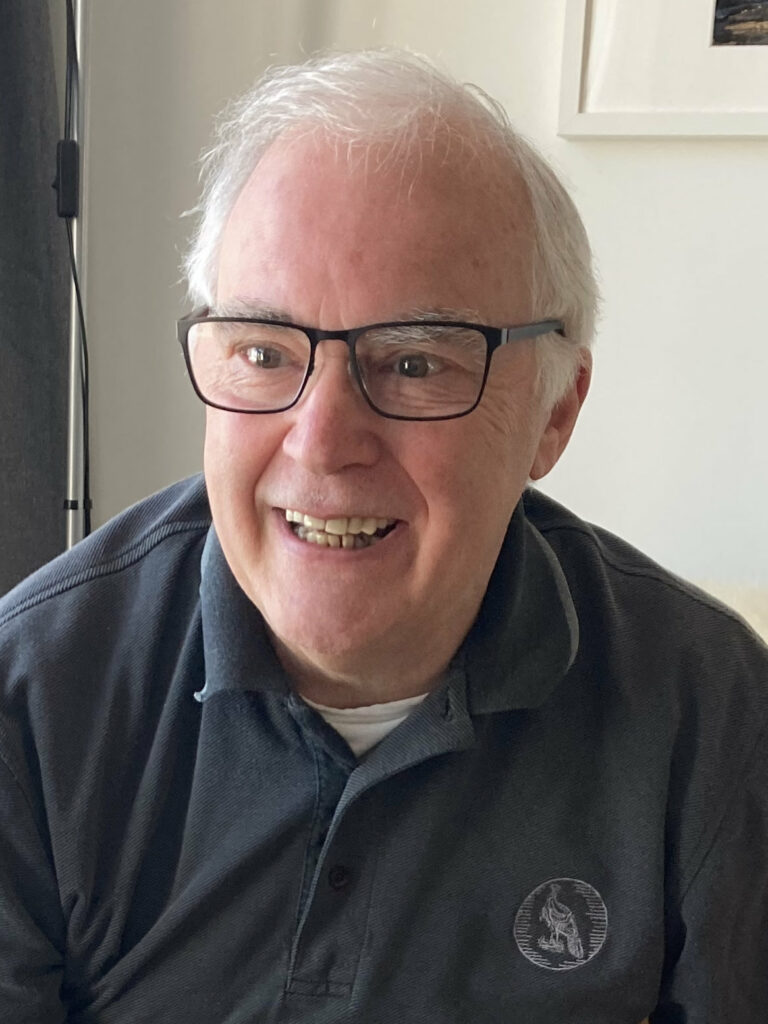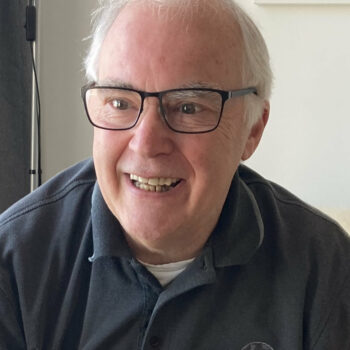Taking part in research: a patient’s perspective
When Mike Willis retired four years ago, he was looking forward to learning new skills and exploring new opportunities.
But a diagnosis of Motor Neurone Disease (MND) in 2022 forced Mike to revisit those carefully laid-out retirement plans and change direction. Read his blog to find out more!

“Remain mentally active.” That was the one thing I promised myself when I received my diagnosis of MND.
That was a particular challenge – I’m not a fan of crossword puzzles or anything like that.
But for the past ten years or so, I’ve been involved in Public and Patient Involvement (PPI) in clinical trials – work that I’ve been able to continue post-MND-diagnosis.
And I think it’s definitely helped keep the old grey matter ticking over!
My first foray into the world of PPI started ten years ago, when my GP asked me if I wanted to participate in the RAPSID study, investigating the use of peer-to-peer groups for the improved control of type-2 diabetes.
Following my retirement I joined several PPI teams for studies investigating weight loss and management to achieve remission of type-2 diabetes, at both MRC Cambridge (GLoW and SWiM) and Leeds Beckett University (Re:Mission).
I was also involved in the NERVE study sponsored by University Hospitals Dorset, evaluating a low-cost method to detect peripheral neuropathy in diabetes patients.
As I write this, I’m a member of the Cambridge University Hospitals PPI panel that reviews study proposals and documents, and more recently I’ve started reviewing project grant applications for the National Institute of Health and Care Research (NIHR).
Helping researchers find the best treatments and care
So why do I think people like you and me need to take part in research? Well, if you’re suddenly taken ill and rushed to hospital, or your GP refers you to a hospital clinic for further investigation, or you’re put on drugs to control a new condition, you want to know that you are getting the best possible treatment.
In fact, you can volunteer to help make sure that happens!
No new drug, procedure, test or treatment can be rolled out across the NHS without being clinically tested and proven. And to do that requires help from patients and members of the public.
Ways you can take part
- Volunteer as a patient
The input from patients and the public can be in a range of ways. The most obvious and well-known is to take part in a trial as a patient. This may happen if your GP Practice or Clinic is helping with a study and you are asked if you wish to take part, which is what happened to me 10 years ago!
Or you can visit the NIHR’s Be Part of Research website to see what opportunities there are and sign up for notifications for future research.
Nothing wrong with you? Lucky you, but in fact you can volunteer as a healthy person too, for comparison purposes in trials!
Each study has its own Patient Information Leaflet, explaining about the study, how much of your time will be needed, and any other details you may need.
All trials are vetted and approved by an ethical team, so rest assured you will be treated well and monitored carefully.
My experience of being on a study was interesting. The participants were randomised to different groups and we didn’t know what the expected outcome was, until the results were published.
- Volunteer as a public or patient member of a research team
Another way to volunteer is to actually be part of the research team.
“How can I do that, I’m not a scientist?” you may ask.
These days, all health-related projects have to include as part of their team members of the public who may have in the past or currently are experiencing the condition under evaluation. This is the Patient & Public Involvement (PPI) team and they help ensure the scientific team and project management focus on the needs of the patients.
Remember that Patient Information Leaflet mentioned just now, that all study patients receive? That will have been reviewed and edited by the project PPI team to make sure it is readily understandable and addresses a patient’s concerns.
The PPI team will do much more than that however – helping to write the project proposal, monitoring the project while it’s running, helping to prepare and review the many documents and reports while the project is in progress, and helping to disseminate the findings to clinicians, patients and the general public.
It’s really interesting to find out how health research projects are carried out, and so satisfying when the results are published!
I’ve just been part of a team evaluating a major NHS England trial, and I helped co-author one of the academic papers and I’m acknowledged on many of the others too!
- Volunteer to decide on research funding
The third way is to actually work for the NIHR, which is the government’s major funder of clinical research in England, as a volunteer reviewer.
We are allocated research proposals to review a few times a year. These detail the objectives of the research, the team that will carry it out, how the study will recruit patients and what they will do, how the results will be compiled and analysed, how the PPI team will be involved and how much it will all cost.
As a lay reviewer I’m sanity-checking the proposal from a patient perspective. Is the recruitment rate of participants realistic? Will they volunteer for the study or be put off by what they are asked to do? Is the PPI team really involved in the study, or are they there just to tick a box? And as one of my special interests, I look for EAU – Excessive Acronym Usage!
The nitty-gritty technical content of the proposal is peer-reviewed by scientists, but the lay reviewers can still contribute greatly to the assessment of each project.
After our reviews are submitted, the proposal will move onto a funding committee that decides whether it goes ahead, rejected or sent back for changes.
We get feedback of all of the review comments, so it’s really interesting to see how my comments and views on a study compare with others.
So there you have it! You can volunteer at all ages, and young people are under-represented so always welcomed.
There’s normally some financial compensation offered for your time; you won’t get rich but it’s a welcome sign that your time is appreciated and your contribution valued.
And if you do find yourself in a hospital clinic one day, you’ll be proud that the treatment you’ll receive has been developed in conjunction with volunteers like you!
Mike Willis
- To find out more about taking part in research, search #BePartofResearch on X (formerly Twitter).



